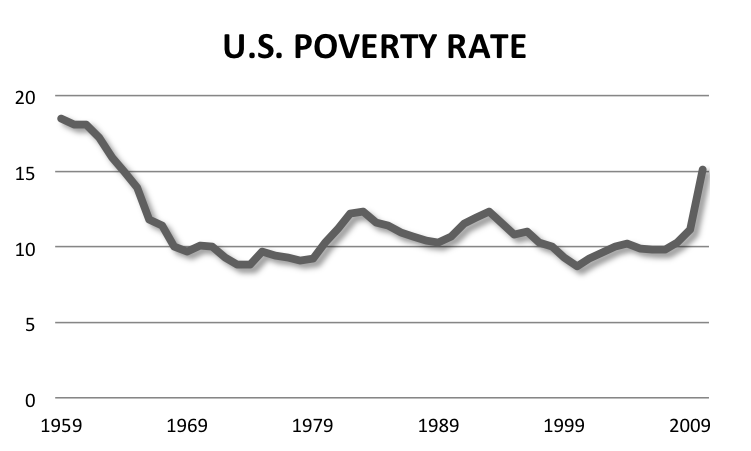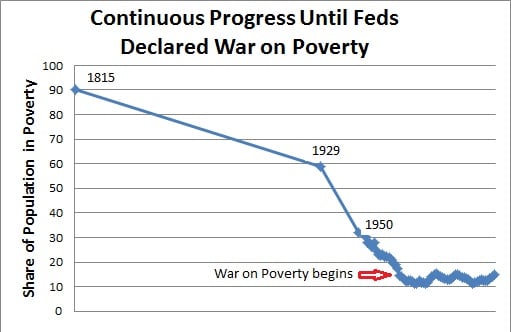

President Barack Obama talks with students and law enforcement officials following a sit-down discussion at the Salvation Army Ray and Joan Kroc Corps Community Center in Camden, N.J., May 18, 2015. (Official White House Photo by Pete Souza)
I’ve written over and over again that the federal government’s so-called War on Poverty has been a disaster. It’s been bad news for taxpayers, of course, but it’s also been bad news for poor people since they get trapped in dependency.
So what’s the alternative? Well, we actually can learn a lot from history.
Let’s start on the other side of the Atlantic. Professor Tyler Cowen of George Mason University has a fascinating video (which is part of a must-watch series) looking at the English debate in the 1830s on how best to deal with poverty.
Now let’s cross the ocean and look at the American experience.
Professor Thomas West of Hillsdale College has researched welfare policies in the early days of the United States.
Here are some of his key findings.
…government-funded welfare, not to mention generous private charity, has existed throughout American history. …The real difference between the Founders’ welfare policies and today’s is over how, not whether, government should help those in need.
Government was involved, but only at the local level, and assistance was a two-way street.
From the earliest colonial days, local governments took responsibility for their poor. However, able-bodied men and women generally were not supported by the taxpayers unless they worked. They would sometimes be placed in group homes that provided them with food and shelter in exchange for labor. Only those who were too young, old, weak, or sick and who had no friends or family to help them were taken care of in idleness.
Here’s more.
Welfare is kept local so that the administrators of the program will know the actual situations of the persons who ask for help. This will prevent abuses and freeloading. …A distinction between the deserving and undeserving poor is carefully observed. Able-bodied vagabonds get help, but they are required to work in institutions where they will be disciplined. Children and the disabled, on the other hand, are provided for, not lavishly but without public shame. …Poor laws to support individual cases of urgent need were not intended to go beyond a minimal safety net. Benefit levels were low.
Interestingly, Professor West writes about Benjamin Franklin’s low opinion of England’s welfare system (as it existed before the 1830s, obviously), which was much more generous.
Here’s some of what Franklin wrote, as cited by West.
I am for doing good to the poor, but I differ in opinion of the means. I think the best way of doing good to the poor, is not making them easy in poverty, but leading or driving them out of it. In my youth I travelled much, and I observed in different countries, that the more public provisions were made for the poor, the less they provided for themselves, and of course became poorer. And, on the contrary, the less was done for them, the more they did for themselves, and became richer.
This was not an unusual perspective.
Franklin’s understanding of the welfare paradox—that aid to the poor must be managed carefully lest it promote indolence and therefore poverty—was shared by most Americans who wrote about and administered poverty programs until the end of the 19th century. …policies were intended to help the poor in ways that did not violate the rights of taxpayers or promote irresponsible behavior.
Thomas Jefferson definitely agreed, as seen in this quote included in Professor West’s analysis.
To take from one, because it is thought his own industry and that of his fathers has acquired too much, in order to spare to others, who, or whose fathers, have not exercised equal industry and skill, is to violate arbitrarily the first principle of association, the guarantee to everyone the free exercise of his industry and the fruits acquired by it.
If you remember the discussion of “indoor” and “outdoor” relief from the video about the English welfare system, you won’t be surprised to learn similar issues were present in the United States.
As the poor population grew, many concluded that “outdoor relief” was leading people to look on welfare as an entitlement and creating a class of permanent dependents. Consequently, the emphasis soon shifted to “indoor relief”—almshouses and workhouses.
Professor West also cites the strong role of private charity, which also was based on tough-love compassion.
After the Revolution and throughout the 19th century, hospitals for the poor, educational institutions, YMCAs, and Salvation Army branches were established in growing numbers all over America by public-spirited citizens. Like the public workhouses, these private charities distinguished between deserving and undeserving poor. Good character, it was thought, would enable most people to become self-sufficient. These agencies tried to build the character of their recipients through education, moral suasion, religious instruction, and work.
Now let’s see what West says about the effectiveness of the tough-love approach from America’s past with the entitlement approach used today.
If we rank poverty and welfare policies in terms of quantity of money and material goods given to people who are poor, then today’s policies are far more effective than the Founders’. Benefit levels are much higher, and far more people are eligible for support. …However, if poverty and welfare policies are judged by their effectiveness in providing for the minimal needs of the poor while dramatically reducing poverty in a society over time, then America before 1965 could be said to have had the most successful welfare policy in world history. By the same benchmark, post-1965 poverty programs have failed.
In other words, if the goal is to make people comfortable in dependency, the current system is a big success.
But if the goal is self reliance and reduced poverty, than the current system is a terrible failure.
Professor West has some great data on how a combination of long-run growth and a sensible welfare system combined to dramatically reduce destitution between the nation’s founding and the 1960s.
Two centuries ago, most Americans—at least 90 percent—were desperately poor by today’s standards. Most houses were small, ill-constructed, and poorly heated and insulated. Based on federal family income estimates, 59 percent of Americans lived in poverty as late as 1929, before the Great Depression. In 1947, the government reported that 32 percent of Americans were poor.
This is fascinating and valuable information. At least for those of us with a wonky interest in public policy.
Back in 2010, I shared a chart based on far more limited data to show the poverty rate consistently falling after World War II.

But only up to a point. Once the federal government declared War on Poverty in the mid-1960s, we stopped making progress.
Now, based on Professor West’s data, I can create a chart going back to 1815.
I arbitrarily connected the data points with straight lines for lack of any other obvious alternative, but that’s not important. The key point of the graph is to see that the level of poverty dramatically before Washington got involved.

Professor West puts 2 and 2 together and gets 4.
…before the huge growth in government spending on poverty programs, poverty was declining rapidly in America. After the new programs were fully implemented, the poverty rate stopped declining.
Let’s begin to wrap up our discussion.
West points out that Benjamin Franklin’s criticisms of the English welfare system apply even more so to the mess we have in America today.
And this is a very costly mistake.
The incentive structure of the modern welfare state is similar to the one that Franklin condemned in old England, except that ours is more generous and more tolerant of single motherhood. Since 1965, when President Lyndon Johnson inaugurated the modern War on Poverty, total annual government welfare spending has grown from less than $9 billion (1.3 percent of gross domestic product) to $324 billion (5 percent of GDP) in 1993 to $927 billion (6 percent of GDP) in 2011.Between 1965 and 2013, the government spent $22 trillion (adjusted for inflation) on means-tested welfare programs—more than three times the costs of all military wars in the history of the United States. …These figures do not take into account state, county, and municipal benefits. Nor do they take into account the massive use of Social Security Disability as a de facto welfare program (as of 2005, 4.1 percent of Americans between the ages of 25 and 64 were enrolled).
We had successful welfare reform in the 1990s, to be sure, but it dealt with just one program.
The overall trend, as discussed two days ago, is ever-growing levels of dependency.
The basic problem—that government makes it affordable for women to bear and raise children without husbands while living independently in households of their own—is still there. …High benefit levels and irresponsible attitudes toward sex and marriage create a world in which many children have few or no ties to their fathers; in which mothers, increasingly unmarried, are more often abused and exploited; and in which many men join gangs and take up crime as a way of life. …The contemporary outlook on welfare has both propelled the family’s disintegration and promoted vast dependence. …antipoverty programs can easily have a corrupting effect if they are not set up in a way that promotes rather than breaks down the morality of self-restraint and self-assertion that is a necessary foundation of what Jefferson called “temperate liberty.”
I guess what we have now in America is intemperate dependence.
Hmmm, maybe the solution is to go back to the system that worked. And that means getting Washington out of the business of income redistribution.
READ ALSO: War On Poverty Cost Has Been Far Greater Than Money Can Measure
[mybooktable book=”global-tax-revolution-the-rise-of-tax-competition-and-the-battle-to-defend-it” display=”summary” buybutton_shadowbox=”true”]






